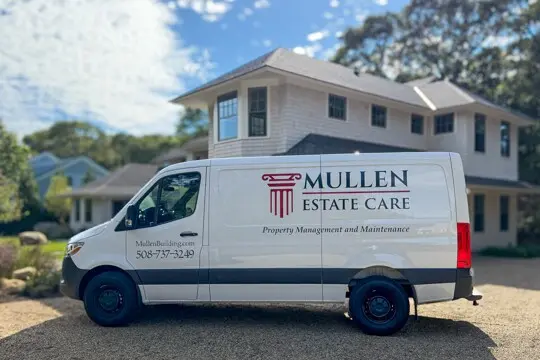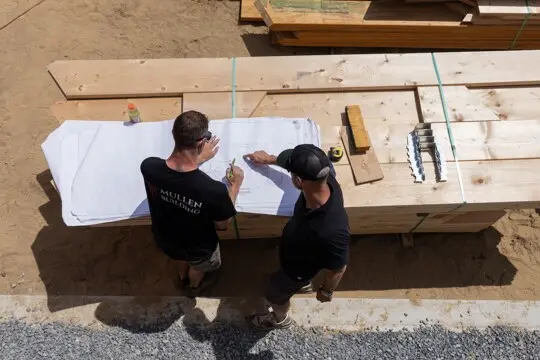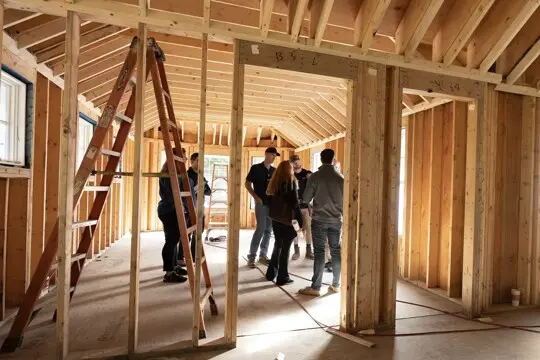
Insights
Architect or Builder: Who Do I Contact First?
When embarking on building a new custom home or major renovation project on Cape Cod, one of your first decisions is whether to contact an architect or builder first. The answer to this seemingly simple question isn't as straightforward as many assume.
The truth is, you can successfully start with either an architect or a custom home builder. What matters most is ensuring all parties can work collaboratively from the project's inception. The key to a successful home construction project isn't about who you hire first, but in assembling a team that communicates effectively throughout the entire process.
Today's Approach to Construction Projects
Historically, most construction projects followed the design-bid-build model: hire an architect, finalize plans, then seek bids from general contractors. While this traditional approach still works in some cases, the industry has evolved toward more integrated methods that produce better outcomes for custom home projects.
Collaboration between architect and builder during the design phase—rather than after—leads to better results.
This integrated approach, often called a preconstruction or discovery phase, brings valuable insights from both design and construction professionals before the first shovel hits the ground.
Why Early Builder Involvement Matters
Budget Reality and Cost Control
One of the most compelling reasons to involve an experienced builder early in the architectural design process is budget management. Architects excel at designing innovative and inspiring homes, but they may not always have current knowledge of construction materials costs or labor pricing.
When a custom builder participates in the design process, they provide real-time cost feedback that keeps the project realistic. This prevents the common scenario where architectural plans exceed the homeowner's budget, requiring costly design changes later in the process.
Constructability and Practical Solutions
Experienced builders bring practical knowledge about what works—and what doesn't—in actual construction. They understand how different building materials perform, which construction methods are most efficient, and how to navigate local building codes and permitting processes.
For Cape Cod projects specifically, this local expertise is invaluable. Understanding coastal regulations, historical district requirements, and seasonal construction considerations can save significant time and costs throughout the construction phase.
Value Engineering Opportunities
When builders are involved from the beginning, they can suggest value engineering alternatives that maintain the design intent while optimizing costs. This might include recommending different construction materials that achieve the same aesthetic at a lower price point or suggesting modifications that simplify the construction process without compromising the final result.
The Architect's Irreplaceable Value
Creative Vision and Design Excellence
Architects bring unmatched expertise in translating your vision into functional, beautiful spaces. They understand how to optimize natural light, create flow between rooms, and design homes that enhance daily living while maintaining strong resale value.
Good design is an investment that pays dividends every day you live in your home and when you eventually sell. Architects ensure your custom home reflects your personal style while incorporating timeless design principles that will remain appealing for decades.
Technical Expertise and Code Compliance
Licensed architects possess deep knowledge of building codes, zoning regulations, and structural requirements. They coordinate with structural engineers and other specialists to ensure your new home meets all safety and legal requirements.
For luxury custom homes, architects also bring expertise in integrating complex systems—from smart home technology to sophisticated HVAC systems—in ways that maintain the design aesthetic.
Long-term Perspective
Architects think beyond immediate needs to consider how your home will serve you over time. They design spaces that can adapt as your family grows or changes, incorporating universal design principles that ensure your home remains functional throughout different life stages.
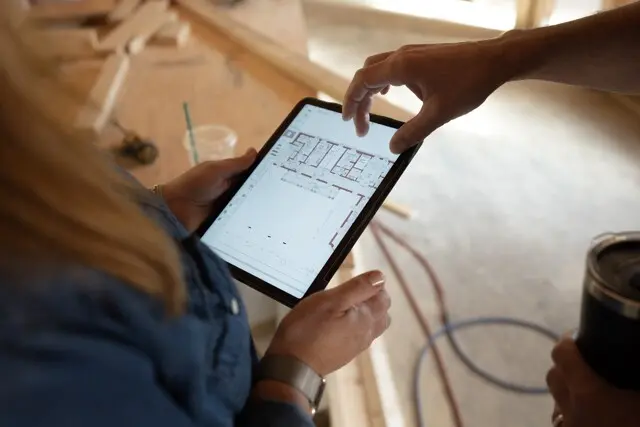
Building Your Project Team: The Collaborative Approach
The most successful construction projects result from early collaboration between all team members. Rather than choosing between an architect or builder first, consider how to bring both parties together during the initial planning phase.
Preconstruction Services: The Modern Advantage
Many experienced custom home builders now offer preconstruction services that begin before architectural design is complete. During this phase, the building team works alongside architects and interior designers to:
- Establish realistic budget parameters
- Provide ongoing cost estimates during design development
- Identify potential construction challenges early
- Suggest material and method alternatives
- Streamline the permitting process
This collaborative approach prevents the delays and cost overruns that often plague projects where design and construction teams work independently.
Establishing Clear Communication Protocols
Successful custom build projects require clear communication channels between all parties. Project managers should facilitate regular meetings between the design team and construction team, ensuring everyone understands the design intent and budget constraints.
Regular updates throughout the design phase help prevent miscommunication that can lead to costly revisions during construction. When architects, builders, and homeowners maintain open dialogue, the final result more closely matches the original vision.
Key Factors To Success
Proven Collaborative Relationships
Look for architects and builders who have successfully worked together on previous projects. Established working relationships often translate to smoother project execution and better outcomes.
Transparent Budget Management
Both your architect and builder should provide detailed cost estimates and updates throughout the design process. This transparency helps you make informed decisions about design changes and material selections.
Experience with Luxury Projects
Custom homes require different expertise than standard construction. Ensure both your architect and builder have extensive experience with luxury projects and understand the unique challenges they present.
Local Market Knowledge
For Cape Cod projects, prioritize professionals with deep local knowledge. Understanding regional architectural styles, local suppliers, and municipal requirements can significantly impact project success.
Red Flags to Look Out For
Adversarial Relationships
Avoid situations where your architect and builder view each other as adversaries rather than partners. Finger-pointing and blame-shifting between parties often signals deeper communication issues that will impact your project.
Lack of Cost Awareness
Be cautious of architects who design without considering budget constraints or builders who can't provide detailed cost breakdowns during the design phase.
Poor Communication Practices
Warning signs include delayed responses to questions, reluctance to participate in team meetings, or failure to provide regular project updates.
Limited High-End Experience
Building luxury custom homes requires specialized knowledge. Avoid professionals whose portfolios primarily consist of standard residential projects.
The Mullen Building Advantage
Cape Cod's unique environment presents both opportunities and challenges for custom home projects. Local builders, like Mullen Building & Remodeling, understand how coastal conditions affect building materials and construction methods. They're familiar with historical district regulations and have established relationships with local officials and suppliers.
Similarly, architects experienced in Cape Cod design understand how to respect the region's architectural heritage while incorporating modern amenities. They know how to design homes that complement their surroundings while providing the luxury and functionality today's homeowners expect.
Making the Decision: It's About the Team
Ultimately, whether you contact an architect or builder first matters less than ensuring you build the right team.
Set your project up for success by following these best practices:
- Start the conversation early with both potential architects and builders.
- Evaluate their willingness to collaborate throughout the design process.
- Establish clear communication protocols from the beginning.
- Ensure budget transparency at every phase.
- Choose professionals with complementary expertise and proven track records.
The goal is to create a collaborative environment where design excellence meets construction reality, resulting in a custom home that exceeds your expectations while staying within budget and timeline.
Your dream home deserves the best possible team working together toward a common goal. By focusing on collaboration rather than sequence, you'll set the foundation for a successful project that brings your vision to life with minimal stress and maximum satisfaction.
Frequently Asked Questions
How much should I budget for architectural services?
Architectural fees typically range from 8-15% of construction costs for custom homes, depending on project complexity and scope of services. Discuss fee structures upfront to ensure alignment with your budget.
What's the difference between design-build and traditional construction methods?
Design-build integrates architectural design and construction under one vendor and contract, while traditional methods involve separate contracts with architects and builders.
How long does the design phase typically take?
The architectural design phase for custom homes usually takes 6-12 months, depending on project complexity and revision cycles. Early builder involvement can help streamline this timeline.
Should I get multiple bids even if I work with a collaborative team?
While not always necessary with integrated teams, obtaining multiple estimates can provide valuable cost comparisons. Focus on comparing qualifications and approach, not just pricing.
What role do interior designers play in the process?
Interior designers should be involved early in the design process to ensure architectural plans accommodate your aesthetic vision and functional needs. The best results come from coordinated efforts between all design professionals.
How do I know if my architect and builder will work well together?
Ask for references from previous collaborative projects, request to see examples of their joint work, and observe their communication during initial meetings. Professional respect and clear communication protocols are essential indicators.
What happens if my project goes over budget during construction?
Collaborative teams with preconstruction services can minimize budget overruns through continuous cost monitoring. However, establish clear change order procedures upfront to handle any necessary adjustments.
Do I need both an architect and a general contractor for a major renovation?
Most major renovations benefit from both architectural expertise and experienced construction management. The complexity of your project will determine the specific professional requirements.
Ready to discuss your project?
Keep Reading
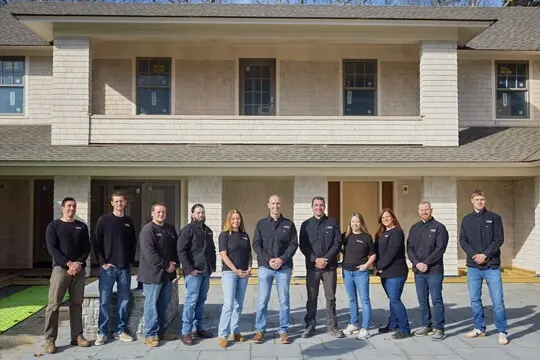
News & Updates
